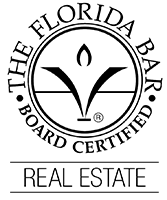Does the Florida Real Estate Seller Need a Lawyer?
Whether selling a home or an office building, the seller of Florida real estate needs a lawyer. Why? Because the seller has two goals: get paid and avoid litigation. The lawyer’s job is to help the seller get paid by preparing and negotiating the listing and sale contracts, helping the seller through the due diligence inspection period, and preparing or reviewing closing documents. The real estate seller’s lawyer can do the following:
- Clear Contract. Litigation is less likely with a clear contract, so the lawyer can assist in preparing and negotiating a clear contract for sale of the real estate. Sometimes this is done with a standard form, such as the FR/Bar form issued by The Florida Bar and Florida Realtors or the FAR forms issued by the Florida Realtors. The lawyer often prepares addenda to these standard forms to clarify aspects of the transaction. Sometimes, however, the lawyer prepares a form specifically for the particular transaction rather than using a standard form that has many provisions that are not applicable to the particular case or that are more favorable to the buyer. Unlike others parts of the real estate sales team, lawyers are trained in the art and use of legal words and the drafting and interpretation of contracts.
- Deadline Follow-up. All contracts for the sale of real estate should include deadlines for such matters as inspections, financing, title insurance, surveys, closing, etc. To avoid litigation, it is important to comply with these deadlines. The lawyer can assist the seller in scheduling contract deadlines in order to achieve the goals of getting paid and avoiding litigation.
- Limit Liability in Contract. Deed and Closing Documents. Legal documents often contain representations and warranties that are binding upon sellers after the closing in a way that may obligate the sellers to pay damages to the buyers even years after the closing. Since the seller’s goals are to get paid (and stay paid) and avoid litigation, it is often important to limit the seller’s representations and warranties in contracts. Lawyers know which warranties and representations are standard and which are not, which can be negotiated out and which must stay.
- Cashier’s Check or Wire Transfer at Closing. The seller should accept only a cashier’s check or a wire transfer of net proceeds at the closing. If the seller accepts a closing agent’s escrow check, then the seller accepts the risk if the check fails. While most closing agencies are reputable, there is no way to tell whether its escrow check will be honored by your bank. If it is not, the seller loses and the buyer gets to keep the deed. So, it is essential that the seller only accept a cashier’s check or wire transfer at closing.
Therefore, the seller of Florida real estate, whether it is residential or commercial, should always engage a Florida lawyer to assist in the transaction.
For additional information, see the free ebook written by Florida lawyer James W. Martin on Florida Real Estate Sales Contracts.






